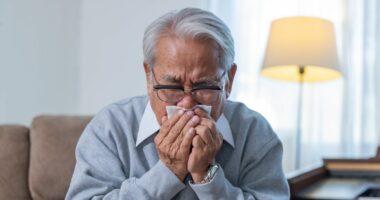Share this @internewscast.com
The NHS is advising individuals to adhere to a 10-day isolation period if they contract Covid-19, emphasizing caution even as recent figures show a slight reduction in cases across the UK.
According to the latest data shared by the UK Health Security Agency (UKHSA), collected in the week ending October 27, there has been a notable decline in Covid-related hospitalizations.
The average weekly positivity rate for Covid-19 in hospital settings has decreased to 5.7 percent, a drop from the previous week’s 7.7 percent. This suggests a positive trend, yet the virus continues to circulate widely.
In terms of hospital admissions, the rate has fallen to 2.22 per 100,000 people, down from 2.51 per 100,000 the prior week. This indicates a slight easing of the burden on the healthcare system.
However, the data highlights that those aged 85 and over remain at a higher risk, with their hospital admission rate being the highest, though it has decreased from 28.59 to 22.71 per 100,000.
In its public health advice, the NHS suggests that most individuals do not need to use a rapid lateral flow test if they exhibit Covid symptoms. These guidelines are available on the NHS website for those seeking further information on managing their symptoms and protecting others.
It is also recommended that you:
- Try to stay at home and avoid contact with other people for three days after the day the test was taken if you or your child are under 18 years old – children and young people tend to be infectious for less time than adults
- Try to stay at home and avoid contact with other people for five days after the day you took your test if you are 18 years old or over
Find out about the symptoms you need to watch out for and get health advice with our free health newsletter from the Daily Express
Symptoms
According to the NHS, COVID-19 symptoms can include:
- A high temperature or shivering (chills) – a high temperature means you feel hot to touch on your chest or back (you do not need to measure your temperature)
- A new, continuous cough – this means coughing a lot for more than an hour, or three or more coughing episodes in 24 hours
- A loss or change to your sense of smell or taste
- Shortness of breath
- Feeling tired or exhausted
- An aching body
- A headache
- A sore throat
- A blocked or runny nose
- Loss of appetite
- Diarrhoea
- Feeling sick or being sick
“The symptoms are very similar to symptoms of other illnesses, such as colds and flu,” the NHS says. “Most people feel better within a few weeks, but it can take longer to recover.
“For some people, it can be a more serious illness and their symptoms can last longer.”
To help ease symptoms, the NHS says you should:
- Get lots of rest
- Drink plenty of water to avoid dehydration (your pee should be light yellow or clear)
- Take paracetamol or ibuprofen if you feel uncomfortable
- Try having a teaspoon of honey if you have a cough – do not give honey to babies under 12 months
- Try turning the heating down or opening a window to help with breathlessness
- Breathe slowly in through your nose and out through your mouth, with your lips together like you’re gently blowing out a candle
- Sit upright in a chair to help with breathlessness
- Relax your shoulders, so you’re not hunched to help with breathlessness
- Lean forward slightly – support yourself by putting your hands on your knees or on something stable like a chair to help with breathlessness
- Not lie on your back if you have a cough – lie on your side or sit upright instead
- Not use a fan to cool your room as it may spread the virus
- Try not to panic if you’re feeling breathless – this can make it worse
For more information, visit the NHS website here.












